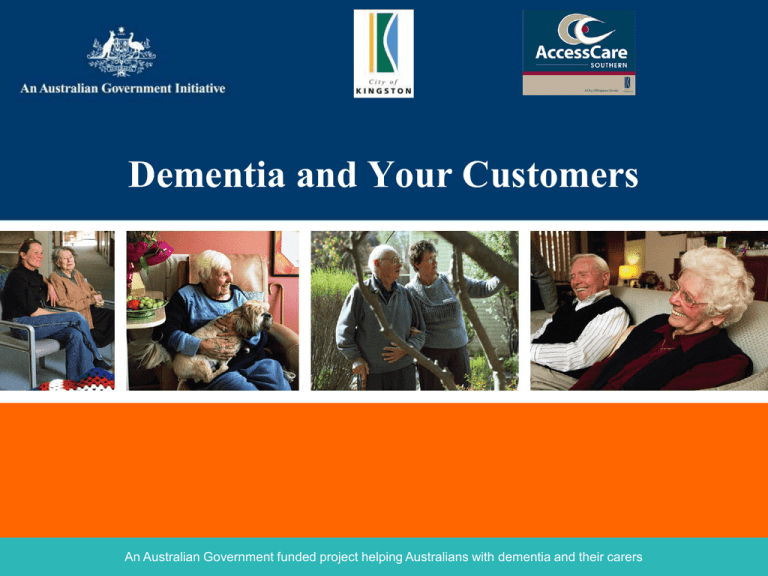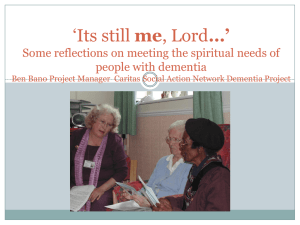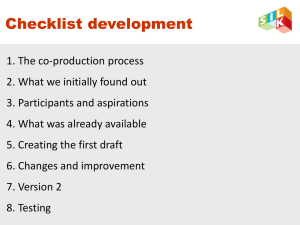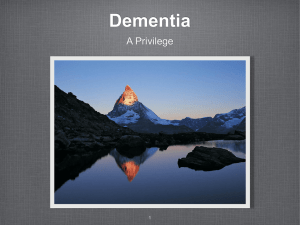
Dementia and Your Customers
1
An Australian Government funded project helping Australians with dementia and their carers
Part 1
Dementia
The how, what, when & where
2
An Australian Government funded project helping Australians with dementia and their carers
Definition of dementia
• “Dementia is the term used to describe the symptoms of
a large group of illnesses which cause a progressive
decline in a person’s functioning. It is a broad term
used to describe a loss of memory, intellect, rationality,
social skills and what would be considered normal
emotional reactions.” There are a variety of causes. The
most common cause of dementia is Alzheimer’s disease.
(Alzheimer's Australia www.alzheimers.org.au )
3
An Australian Government funded project helping Australians with dementia and their carers
• Dementia is NOT a normal part of ageing.
• However, the longer a person lives, the more likely they
are to develop dementia.
• Dementia is more common after the age of 65 years.
• The risk is one person in four over the age of 85 years.
• People in their 40s and 50s can also have dementia.
4
An Australian Government funded project helping Australians with dementia and their carers
• A person with dementia needs to be valued and treated
as an individual with dignity and respect.
• It is important for others to try and look at the world
from the person’s perspective in order to have a better
understanding of them and be able to assist them in
their day to day life.
5
An Australian Government funded project helping Australians with dementia and their carers
Partner logo here
Prevalence of dementia
• Australia
– 2008 – 227,300
– 2050 – 1,130,691
(Access Economics 2009)
• World
– 2009 – 35.6 million
– 2050 – 115 million
(www.alz.com 2009)
6
An Australian Government funded project helping Australians with dementia and their carers
Parts of the brain
(www.health.qld.gov.au/abios/images/brain.gif )
7
An Australian Government funded project helping Australians with dementia and their carers
Normal Brain Function
• The brain is divided into 6 main parts, each of which
has its own separate functions. They are:
– Frontal lobe – Planning, organisation and decisionmaking. Social behaviour and starting and stopping
tasks.
– Temporal lobe – Memory of what is read, seen or
heard.
8
An Australian Government funded project helping Australians with dementia and their carers
– Parietal lobe – Language, speech, reading, maths,
spatial awareness, recognition and naming.
– Occipital lobe - Vision
– Cerebellum – Balance, coordination of voluntary
movement
– Brain stem – Breathing, heart rate, swallowing,
reflexes, temperature, blood pressure, etc.
9
An Australian Government funded project helping Australians with dementia and their carers
The neuron forest
•
© 2010 Alzheimer's Association. www.alz.org. All rights reserved. Image credit: Jannis Productions. Stacy Jannis
.
10
An Australian Government funded project helping Australians with dementia and their carers
Cell signaling
•
© 2010 Alzheimer's Association. www.alz.org. All rights reserved. Image credit: Jannis Productions. Stacy Jannis
.
11
An Australian Government funded project helping Australians with dementia and their carers
Signs and symptoms of dementia
• Memory loss, particularly recent memory, that disrupts
daily life
• Confusion with time or place
• Language problems (speaking & writing)
• Difficulty finding the right words
• Repeating the same story over and over and/or
repetitive questioning
12
An Australian Government funded project helping Australians with dementia and their carers
• Difficulty with familiar tasks
• Need for assistance with daily living
• Poor judgement
• Frequently “losing” things and being unable to retrace
steps
• Loss of initiative and withdrawal from usual activities
13
An Australian Government funded project helping Australians with dementia and their carers
• Fear, nervousness, sadness, anger, depression and
crying
• Trouble understanding visual images and spatial
relationships
• Difficulty with planning
• Mood and personality changes
14
An Australian Government funded project helping Australians with dementia and their carers
Under the microscope
•
© 2010 Alzheimer's Association. www.alz.org. All rights reserved. Image credit: Jannis Productions. Stacy Jannis
.
15
An Australian Government funded project helping Australians with dementia and their carers
•© 2010 Alzheimer's Association. www.alz.org. All rights reserved. Image credit: Jannis Productions. Stacy Jannis
.
16
An Australian Government funded project helping Australians with dementia and their carers
Effects of dementia
• Effects of dementia on person
– Emotional
– Physical
– Social
• Effects of dementia on family and friends
– Emotional
– Physical
– Social
17
An Australian Government funded project helping Australians with dementia and their carers
Common causes of dementia
• There are over 100 conditions that cause dementia.
• Some common types and causes of dementia are:
– Alzheimer’s disease (50%-70% of cases)
– Vascular dementia
– Dementia with Lewy bodies
– Fronto Temporal Lobar Degeneration
18
An Australian Government funded project helping Australians with dementia and their carers
Rarer causes of dementia
– Parkinson’s disease
– Alcohol related dementia (Korsakoff’s syndrome)
– Creutzfeldt-Jacob disease (mad cow disease)
– AIDS related dementia
– Huntington’s disease
19
An Australian Government funded project helping Australians with dementia and their carers
Can dementia be prevented?
• Dementia cannot be prevented
• However a healthy brain reduces the risk of developing
dementia.
20
An Australian Government funded project helping Australians with dementia and their carers
Tips for a healthy brain
• Stay mentally active
• Stay physically active
• Eat a healthy diet
• Have regular health checks
• Maintain an active social life
• Protect your head from injury
• Avoid or minimise unhealthy habits
21
An Australian Government funded project helping Australians with dementia and their carers
Part 2
Communication skills
Communicating with people with dementia
22
An Australian Government funded project helping Australians with dementia and their carers
Communication
Communication is a way of understanding each other and
we use it for many reasons and using a variety of
methods. It is a very complex task requiring
observation, listening and remaining engaged.
Communication consists of three parts:
• Body language – 55%
• Tone and pitch of voice – 38%
• Words we use – 7%
(www.getthejob.com.au/jobinterview/bodylanguage.htm )
23
An Australian Government funded project helping Australians with dementia and their carers
We communicate:
• With or through words
• With body language
• With visual images
• With tone and pitch of voice
• With touch
• With writing
• With our behaviours
• By recognizing that we need to adjust our methods for different
people and circumstances
24
An Australian Government funded project helping Australians with dementia and their carers
Body Language
Body language includes:
• Gestures
• Facial expressions e.g. smiling, frowning
• Eye contact
• Touch
• Posture
25
An Australian Government funded project helping Australians with dementia and their carers
• Movements
• Distance and space (personal, social and public)
• Dress and appearance
• Timing
• Tone and pitch of voice
• Head shaking or nodding, shrugging
26
An Australian Government funded project helping Australians with dementia and their carers
Listening
• Listening is an important part of communication.
• Being a good listener takes skill.
• Good listening skills:
– Maintain eye contact
– Ask questions
– Maintain interest
– Allow plenty of time
– Nod or acknowledge speaker
27
An Australian Government funded project helping Australians with dementia and their carers
• Poor listening skills:
– Easily distracted
– Interrupting
– Do not ask questions
– Rush speaker
– Appear disinterested
28
An Australian Government funded project helping Australians with dementia and their carers
Culture and dementia
• Knowledge of different cultures is important when
working with people with dementia.
• More than one in five people in Australian were born
overseas (Australian Bureau of Statistics)
• 35% of people over 65 were born overseas
• Over 400 different languages are spoken including 95
Aboriginal languages. (Australian Bureau of Statistics)
29
An Australian Government funded project helping Australians with dementia and their carers
• Different cultures have diverse perspectives about
dementia so there is a need to be culturally specific
when working or communicating with them.
• As dementia progresses people tend to revert to their
first language as it is an earlier memory.
• This can cause further problems if the person grew up
speaking a dialect as it may be difficult to find an
interpreter.
30
An Australian Government funded project helping Australians with dementia and their carers
• This loss of ability to communicate verbally increases social
isolation for people with dementia.
• When a person is unable to communicate verbally with carers,
professionals or even family they become even more disempowered
and isolated.
• Body language and tone of voice become even more important
when this happens.
• Employing bilingual staff is optimal, but not always possible.
31
An Australian Government funded project helping Australians with dementia and their carers
Dementia and Communication
• Dementia impairs a person’s ability to communicate
effectively. It affects receptive and expressive language.
• When people with dementia have difficulty
communicating they can often become upset.
32
An Australian Government funded project helping Australians with dementia and their carers
People with dementia may:
• Have difficulty finding the right words
• Invent new words to describe familiar objects
• Talk fluently but not make sense
• Confabulate
• Have difficulty organising words logically
• Use familiar words repeatedly
• Not understand part or all of what is being said
33
An Australian Government funded project helping Australians with dementia and their carers
• Easily lose their train of thought
• Have their reading and writing skills deteriorate
• Revert to speaking in their first language
• Lose the normal social conventions
• Swear
• Speak less often
• Often rely on body language
• Have difficulty expressing emotions
34
An Australian Government funded project helping Australians with dementia and their carers
Hints for communicating with people with dementia
• Approach from the front
• Identify yourself and address the person by name
• Reduce environmental distractions such as radio or
television
• Treat the person with dignity and respect
• You may need to use an interpreter
• Check to see if person also has hearing or vision
impairment
35
An Australian Government funded project helping Australians with dementia and their carers
• Be patient and appear interested
• Use short, simple sentences
• Speak slowly and clearly in a matter of fact way
• Allow plenty of time and wait patiently for a response
• Use body language effectively (facial expressions, gestures,
posture, touch, personal space)
36
An Australian Government funded project helping Australians with dementia and their carers
Partner logo here
• Give one step directions
• Give visual cues
• Write down reminders
• Incorporate information into your conversation that
will assist in orientating them
• Be aware of memory impairment
• Be aware of the tone of your voice
37
An Australian Government funded project helping Australians with dementia and their carers
Do not:
• Argue – it will make the situation worse
• Tell the person what they can’t do – tell them what they
can do
• Talk down to the person as if they are a young child
• Ask a lot of questions
Talk about a person with dementia as if they are not
present, even if you think that they cannot understand
you.
38
An Australian Government funded project helping Australians with dementia and their carers
Therapeutic approaches to communication
Reality therapy
Reality orientation can be used to orientate a
person with dementia as to where they are, the
time, date or occasion, and who various people are.
Its goal is to assist the person to relate to their
environment so that they can continue to function
within it.
39
An Australian Government funded project helping Australians with dementia and their carers
Therapeutic approaches to communication
Reminiscence Therapy
• Reminiscence is the act of recalling or talking about the
past.
• It can provide pleasure to people with dementia can
recall past events and experiences.
• Reminiscence is beneficial to the person with dementia.
40
An Australian Government funded project helping Australians with dementia and their carers
Therapeutic approaches to communication –
Validation Therapy
• Validation involves acknowledging and respecting the
feelings of people with dementia.
• These feelings and thoughts are real to them, even if we
know that they are not real to us.
• The principles of validation complement the principles
of person-centred care and help people with dementia
to feel safe.
41
An Australian Government funded project helping Australians with dementia and their carers
Part 3
Behaviours of Concern
and how to minimize them
42
An Australian Government funded project helping Australians with dementia and their carers
• “If we spent as much time trying to understand
behaviour as we spend trying to manage or control it,
we might discover that what lies behind it is a genuine
attempt to communicate.”
Goldsmith, M ‘Slow down and listen to their voices,’ Journal of Dementia Care, 4 (4)
24–25 (1996)
43
An Australian Government funded project helping Australians with dementia and their carers
Behaviours of Concern
• There are some common behaviours that are often
displayed by people with dementia. It is important to
know that these behaviours are NOT deliberate, but
part of the dementia.
44
An Australian Government funded project helping Australians with dementia and their carers
Common behaviours
• Aggressive behaviours
• Agitated behaviours
•
•
•
•
Verbal disruption
Confusion
Hallucinations and false ideas
Repetitive questioning
• Suspicion
• Sexually inappropriate behaviour
45
An Australian Government funded project helping Australians with dementia and their carers
Causes of behavioural changes
• As all people are individual, the causes of behavioural
change are also different and everyone will react in
different ways.
• Working out what causes these changes can be quite
complex.
• Families and carers who know the person well are often
aware of the triggers and can prevent or minimise the
problems.
46
An Australian Government funded project helping Australians with dementia and their carers
• People who come across a person with dementia in the
course of their work or socialisation do not have the
luxury of this inside knowledge.
• This makes trying to work out the cause of the
behaviour much more difficult and in many cases there
are time constraints.
47
An Australian Government funded project helping Australians with dementia and their carers
Aggressive behaviour
• This may be verbal or physical
• It can occur suddenly for no apparent reason
• It may be due to frustration (e.g. unable to be
understood)
• Try to identify the cause
• Focus on feelings
• Try not to get angry or upset
• Try to distract the person
48
An Australian Government funded project helping Australians with dementia and their carers
Anxiety and/or agitation
• The person may be restless
• The person may focus on specific details
• Try to find the cause
• Provide reassurance
• Find something for the person to do
49
An Australian Government funded project helping Australians with dementia and their carers
Verbal disruption
• Try to remain calm
• Avoid confrontation
• Try to explain what is happening even if the person
cannot understand you, your tone of voice may help to
calm them
50
An Australian Government funded project helping Australians with dementia and their carers
Confusion
• Stay calm
• Try to give a clear, brief explanation
• Use pictures/examples as prompts
• Offer corrections as suggestions
51
An Australian Government funded project helping Australians with dementia and their carers
Repetition
• It may be a word, a phrase or an activity
• Try to find the reason
• Focus on feelings not behaviour
• Stay calm
• If it is a question, respond, even if you have to do it
many times
52
An Australian Government funded project helping Australians with dementia and their carers
Suspicion
• The person with dementia may misinterpret what they
see or hear leading to accusations of theft, infidelity
• Don’t take offense
• Don’t argue
• Offer a simple response
53
An Australian Government funded project helping Australians with dementia and their carers
Sexually inappropriate behaviour
• Try to work out what is causing the behaviour e.g. the
person may want to go to the toilet.
• Try to distract the person
• Focus on the person, not the behaviour
• Try to discourage inappropriate behaviours
54
An Australian Government funded project helping Australians with dementia and their carers
Part 4
Confidentiality and Ethics
55
An Australian Government funded project helping Australians with dementia and their carers
Ethical Issues
• There are many ethical issues associated with dementia.
• People who have dementia are entitled to the same dignity and
respect as everybody else.
• Assisting the person with dementia to maintain their quality of life
by respecting their needs and best interests is paramount to the
success of your interaction.
56
An Australian Government funded project helping Australians with dementia and their carers
• Privacy and confidentiality are important and the
person with dementia is protected by law under the
Privacy Act 1988 and Privacy Amendment Act 2004.
(http://www.austlii.edu.au/)
• These ensure that information about people is collected,
stored and disposed of in the correct way and that
information is only shared with permission and on a
need to know basis.
57
An Australian Government funded project helping Australians with dementia and their carers
• People with dementia;
– Need to be autonomous as much as possible but it is
often difficult to know if they are capable to make
financial decisions.
– May be perceived to be shoplifting.
– May not understand queuing and staying behind
barriers.
(Wood, 2009)
58
An Australian Government funded project helping Australians with dementia and their carers
Ethical Issues
Factors that need to be considered include:
• An ageist attitude
• Coercion
• Taking over tasks
• Avoiding infantilism
59
An Australian Government funded project helping Australians with dementia and their carers
• Public embarrassment
• Recognizing vulnerability
• Talking about people in front of them as if they are not
there
• Undermining confidence
• The need for confidentiality
60
An Australian Government funded project helping Australians with dementia and their carers
• Being aware of the possibility of elder abuse
– Borrowing money
– Stealing
– Intentional embarrassment
– Verbal abuse
– Humiliation
– Threats
– Intimidation
61
An Australian Government funded project helping Australians with dementia and their carers
For more information:
• Dementia Helpline:
FREECALL™ 1800 100 500
• Dementia Behaviour Management Advisory Service
FREECALL™ 1800 699 799
• Aged Care Information Line:
FREECALL™ 1800 500 853
• Commonwealth Carelink and Respite Centres:
FREECALL™ 1800 052 222
62
An Australian Government funded project helping Australians with dementia and their carers
Alzheimer’s Australia
www.alzheimers.org.au/
Alzheimer’s Association (U.S.)
www.alz.org/
Department of Health and Ageing
www.dementia.gov.au/
Department of Human Services (Victoria)
www.dhs.vic.gov.au/home
Commonwealth Carelink and Respite Centre
www.carersupport.org.au/
Seniors Rights Victoria
www.seniorsrights.org.au/
63
An Australian Government funded project helping Australians with dementia and their carers
Carers Victoria
www.carersaustralia.com.au/
Better Health Channel
www.betterhealth.vic.gov.au/
Dementia Behaviour Management Advisory Service
www.alzheimers.org.au/
Centre for Cultural Diversity in Ageing
www.culturaldiversity.com.au/
Alzheimer’s Information in Community Languages
www.alzheimers.org.au/
64
An Australian Government funded project helping Australians with dementia and their carers
Bibliography
•
•
•
•
Australian States and Territories. Report by Access Economics for
Alzheimer’s Australia www.accesseconomics.com.au accessed 30/7/09
Access Economics 2009b Keeping dementia in front of mind: incidence and
prevalence 2009-2050 Report for Alzheimer's Australia
www.accesseconomics.com.au accessed 1/9/09
Alzheimer’s Association
www.alz.org/index.asp accessed 28/9/09
Alzheimer’s Australia
www.alzheimers.org.au
Australian Bureau of Statistics
www.abs.gov.au/
65
An Australian Government funded project helping Australians with dementia and their carers
•
Australasian Legal Information Institute
www.auslii.edu.au
•
Better Health Channel
www.betterhealth.vic.gov.au
Brooker, D. 2007 Person centred dementia care making services better
Jessica Kingsley Publishers, London.
Brooker, D. 2004. What is person centred care for people with dementia?
Reviews in Clinical Gerontology 13 (3) 215-22
Butler, R.N. 1969. Ageism: Another Form of Bigotry Gerontologist 9:24346
•
•
•
66
An Australian Government funded project helping Australians with dementia and their carers
•
DVD. 2008 Strangers in a Strange Land: Cultural Competence in Dementia
Care. Workplace Learning Initiatives Pty Ltd, Maribyrnong, Victoria
•
DVD 2008 Local Knowledge A dementia care e-learning resource for rural
and remote aged care workers Alzheimer’s Australia (WA) Ltd.
•
Elder Abuse Prevention Unit
www.eapu.com.au/ElderAbuse.aspx
•
GetTheJob.com.au
www.getthejob.com.au/jobinterview/bodylanguage.htm
•
Goldsmith, M. 1996 Slow down and listen to their voices, Journal of
Dementia Care, 4 (4) 24–25
67
An Australian Government funded project helping Australians with dementia and their carers
•
•
•
•
•
National Dementia Behaviour Advisory Service. 2003 ReBOC Reducing
Behaviours Of Concern. A hands on guide. Alzheimer’s Australia (SA)
New South Wales Department of Health
www.health.nsw.gov.au/factsheets/general/dementia.html
Queensland Health
www.health.qld.gov.au/abios/images/brain.gif
Seniors Rights Victoria
www.seniorsrights.org.au/
Wood, J. 2009 Older Persons Safety. Presentation for Alzheimer’s
Australia Vic. Hawthorn
68
An Australian Government funded project helping Australians with dementia and their carers










